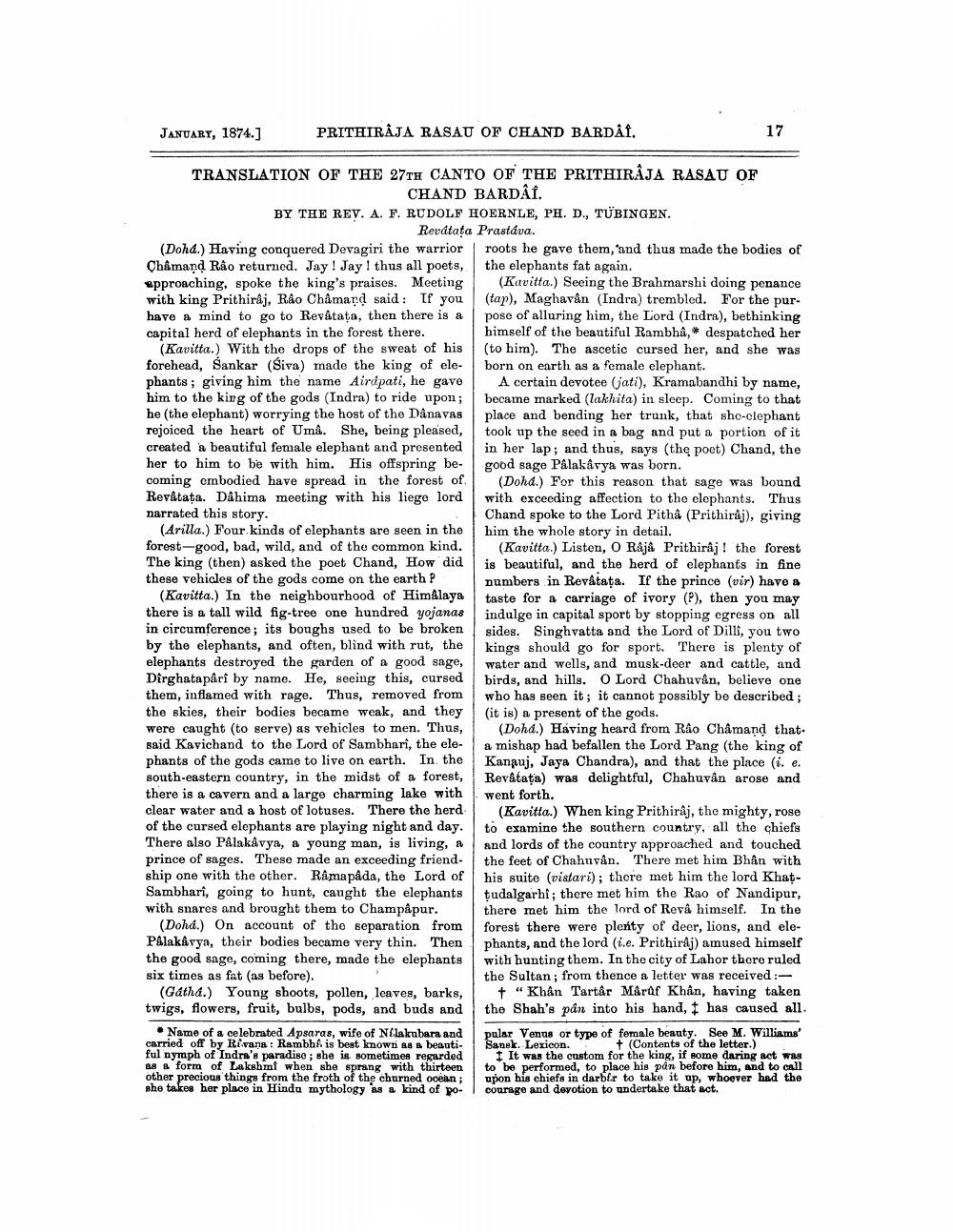________________
JANUARY, 1874.]
PRITHIRAJA RASAU OF CHAND BARDAŤ.
TRANSLATION OF THE 27TH CANTO OF THE PRITHIRAJA RASAU OF
CHAND BARDÂÎ.
BY THE REV. A. F. RUDOLF HOERNLE, PH. D., TÜBINGEN. Revátata Prastáva.
(Dohd.) Having conquered Devagiri the warrior Châmand Râo returned. Jay! Jay! thus all poets, approaching, spoke the king's praises. Meeting with king Prithiraj, Râo Châmand said: If you have a mind to go to Revâtata, then there is a capital herd of elephants in the forest there.
(Kavitta.) With the drops of the sweat of his forehead, Sankar (Śiva) made the king of elephants; giving him the name Airdpati, he gave him to the king of the gods (Indra) to ride upon; he (the elephant) worrying the host of the Dânavas rejoiced the heart of Umâ. She, being pleased, created a beautiful female elephant and presented her to him to be with him. His offspring becoming embodied have spread in the forest of. Revâtața. Dâhima meeting with his liege lord narrated this story.
(Arilla.) Four kinds of elephants are seen in the forest-good, bad, wild, and of the common kind. The king (then) asked the poet Chand, How did these vehicles of the gods come on the earth?
(Kavitta.) In the neighbourhood of Himalaya there is a tall wild fig-tree one hundred yojanas in circumference; its boughs used to be broken by the elephants, and often, blind with rut, the elephants destroyed the garden of a good sage, Dirghatapâri by name. He, seeing this, cursed them, inflamed with rage. Thus, removed from the skies, their bodies became weak, and they were caught (to serve) as vehicles to men. Thus, said Kavichand to the Lord of Sambhari, the elephants of the gods came to live on earth. In the south-eastern country, in the midst of a forest, there is a cavern and a large charming lake with clear water and a host of lotuses. There the herd of the cursed elephants are playing night and day. There also Pâlakâvya, a young man, is living, a prince of sages. These made an exceeding friendship one with the other. Râmapâda, the Lord of Sambhari, going to hunt, caught the elephants with snares and brought them to Champâpur.
(Dohá.) On account of the separation from Palakarya, their bodies became very thin. Then the good sage, coming there, made the elephants six times as fat (as before).
(Gáthá.) Young shoots, pollen, leaves, barks, twigs, flowers, fruit, bulbs, pods, and buds and
Name of a celebrated Apsaras, wife of Nilakubara and carried off by Rivana: Rambhf is best known as a beautiful nymph of Indra's paradise; she is sometimes regarded as a form of Lakshmi when she sprang with thirteen other precious things from the froth of the churned ocean; she takes her place in Hindu mythology as a kind of po
17
roots he gave them, and thus made the bodies of the elephants fat again.
(Kavitta.) Seeing the Brahmarshi doing penance (tap), Maghavân (Indra) trembled. For the purpose of alluring him, the Lord (Indra), bethinking himself of the beautiful Rambhâ, despatched her (to him). The ascetic cursed her, and she was born on earth as a female elephant.
A certain devotee (jati), Kramabandhi by name, became marked (lakhita) in sleep. Coming to that place and bending her trunk, that shc-clephant took up the seed in a bag and put a portion of it in her lap; and thus, says (the poet) Chand, the good sage Pâlakavya was born.
(Dohd.) For this reason that sage was bound with exceeding affection to the elephants. Thus Chand spoke to the Lord Pitha (Prithiraj), giving him the whole story in detail.
(Kavitta.) Listen, O Râja Prithirâj! the forest is beautiful, and the herd of elephants in fine numbers in Revâtata. If the prince (vir) have a taste for a carriage of ivory (?), then you may indulge in capital sport by stopping egress on all sides. Singhvatta and the Lord of Dilli, you two kings should go for sport. There is plenty of water and wells, and musk-deer and cattle, and birds, and hills. O Lord Chahuvân, believe one who has seen it; it cannot possibly be described; (it is) a present of the gods.
(Dohd.) Having heard from Râo Châmand that. a mishap had befallen the Lord Pang (the king of Kanauj, Jaya Chandra), and that the place (i. e. Revâtata) was delightful, Chahuvân arose and went forth.
(Kavitta.) When king Prithiraj, the mighty, rose to examine the southern country, all the chiefs and lords of the country approached and touched the feet of Chahuvân. There met him Bhân with his suite (vistari); there met him the lord Khattudalgarhi; there met him the Rao of Nandipur, there met him the lord of Revâ himself. In the forest there were plenty of deer, lions, and elephants, and the lord (i.e. Prithiraj) amused himself with hunting them. In the city of Lahor there ruled the Sultan; from thence a letter was received:
"Khân Tartar Mârâf Khân, having taken the Shah's pân into his hand, has caused all.
pular Venus or type of female beauty. See M. Williams' Sansk. Lexicon. +(Contents of the letter.)
It was the custom for the king, if some daring act was to be performed, to place his pån before him, and to call upon his chiefs in darbir to take it up, whoever had the courage and devotion to undertake that act.




